Greetings from the European Championships from Montpellier, France (sorry to publish this with a 2-week delay ue to other work).
Montpellier has a small airport and public transport to the city was fine. €2.60 --which I learn afterwards was €1 too much charged by the bus driver-- brought you in 15-20 minutes to the city center. Most things are close enough so that you can walk from one thing to another, which is quite common in European cities unless talking about one of those World Cities like London, Paris or Berlin.
Montpellier has a rich military history, but somehow that is not what caught my eye. On the contrary. I find Montpellier a weird and unrealistic place, almost like I am in the middle of a Cecil B. DeMille historic drama film set in Hollywood. The place is literally unreal. I find the buildings grotesque and kitsch. Many seem to have been built based on the Acropolis, and similar ancient Greek temples. The place is full of bombastic arcs, fountains, and other epigone-like constructions. Very weird.
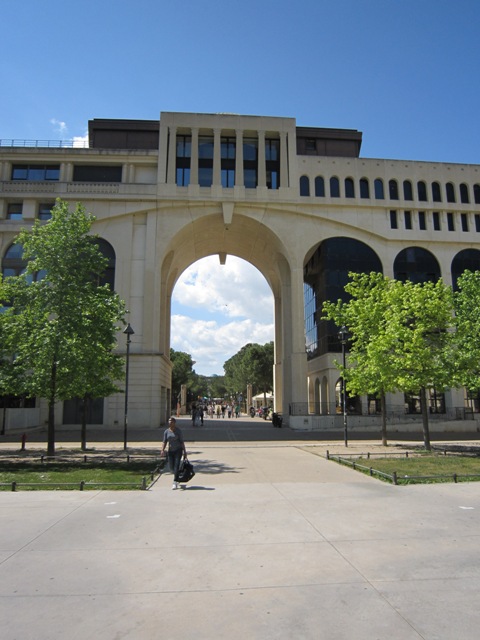
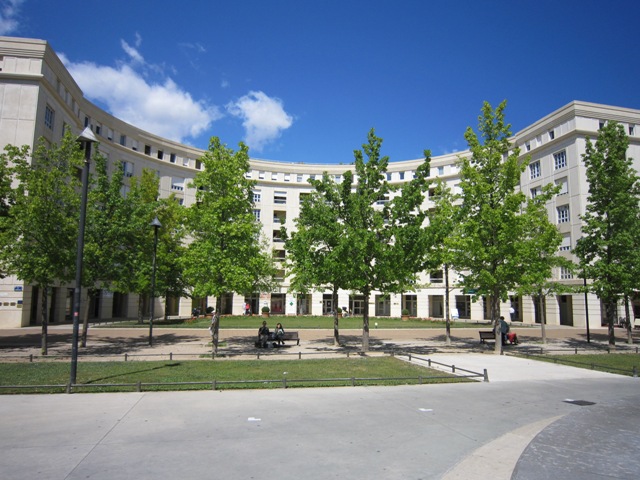
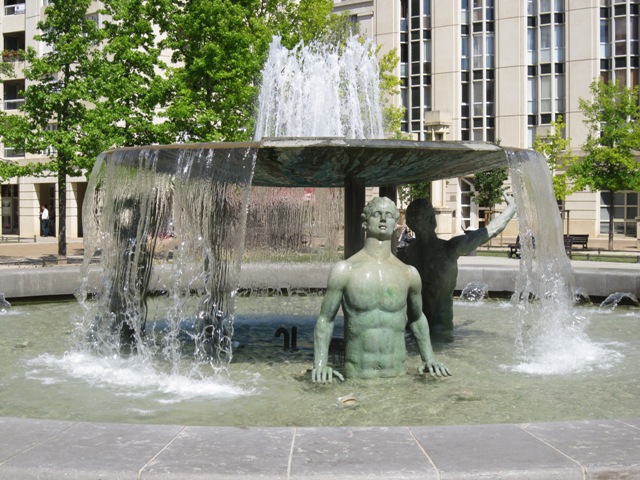
Apparently, it is also the home city of French Judo Federation tribal chief, Jean-Luc Rougé, which likely isn't unrelated to th choice of location.
Today, April 24, the EJU's 5th European Judo Science Symposium took place. Scientific posters were exhibited in the hallway of the second floor.
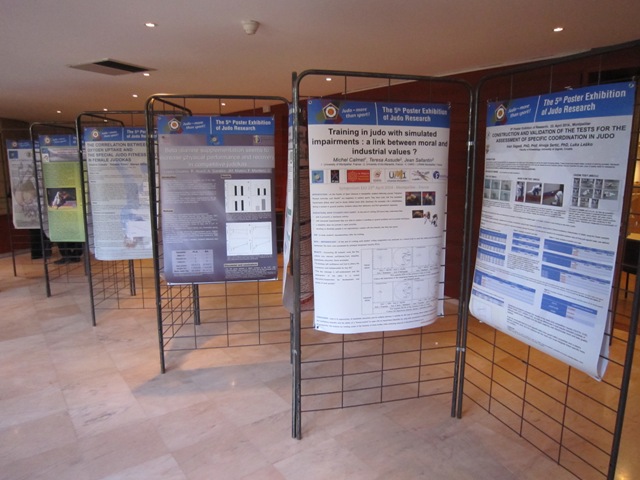
The turn-out was meager.
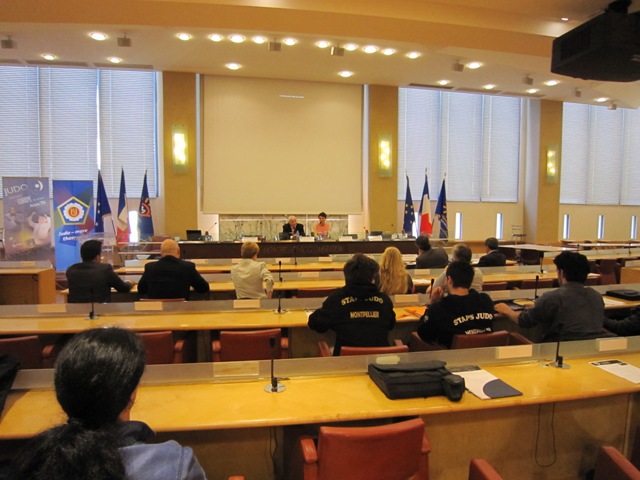
The symposium was supposed to be opened by EJU president Soleveychik but he didn't turn up either. The EJU Vice-President did. There welcome word by a Dean from the University of Montpellier, and an opening lecture by a professor from the same university. Then there were lectures by the winner of last year's poster session, this year's first place and other winners, and then short 5-minute lectures by the others.
Several scientific poster devoted attention to judo-specific fitness tests, either introducing new set-ups, etc. To be honest, much of the research presented was quite mediocre, more kind of undergraduate student work that lacked substance; experimental designs were often flawed, methodology not sound, analytical approach quetionnable, inundated with confounding variables, and knowledge of the existing scientific literature lacking. Many researchers were also unable to adequately respond to questions that were asked although there was also some good work, such as the analysis of judo injuries during the last two Olympic cycles.
Many posters contained abhorent English grammar, filled with typos, etc. As one often sees with students, the focus of the scientific poster becomes some cool background picture and flashi colors. Evidently the core of a scientific poster should be its scientific contribution that is then well-presented; whether that comes on a poster against a "cool background picture" or simply some well-chosen colors is not very relevant. My conclusion is that many presenters simply lacked adequate mentorship from a senior academic.
The session ended by an overview lecture from Professor Sacripanti on the biomechanics of judo, a topic which is very relevant and which he has extensively studie for more than 30 years.
One of the most interesting and somewhat unexpected twists followed after a question by symposium chairman professor Sacripanti to the EJU vice president and chair of the kata committee following a poster presentation. The EJU Kata Chair was asked to give his view on the development and experiences with the kata competitions and to the surprise of almost everthing told that in his view the kata championships were a complete failure that did not achieve what they had hoped for. I know the topic here on the forum often times raises some harsh interchanges which I can somewhat understand knowing that it is something a number of dedicated people devote a lot of energy to, but I am only relaying information here, information which I had not expected, but that due to his nature became one of the most striking conclusions from this symposium.
To me personally it was important as I must admit having pretty much assumed that the entire EJU Kata Committee had completely lost all touch of judo and was wildly enthusiastic about this. After all, it is they who introduced the Judo Show. Anyhow, the Chair elaborated saying that the kata competition produced dead and artificial kata which he totally disliked himself, people posing, with no spirit at all.
To some extent this made all no sense to me because if they think it is such a failure why do they continue it. As you can understand I tackled him (figuratively speaking) on this during the ensuing reception. There is too much to relay here, but pretty much the understanding I got was that they are quitre clueless and adrift. I asked him why those people were in the committee and I was told that basically those were the only ones left or the only ones that could work together as everyone else had collided and it was impossible to work with them. I am not sure that this suffices what is necessary to construct a knowledgeable committee.
I also asked him about the rules, and basically they did not know what else to do or what rules to apply. I asked him if he had sought help from the Japanese or from other 'knoweledgeable people' and I was told that he had attempted several times to seek help from Japanese. According to him the Japanese did not know anything about kata himself. He seemed surprise when I told him that Daigo-sensei was very knowledgeable and that he woul be the person to talk to, and I was told that he had asked him, but that Daigo pretty much seemed to brush it away which by him was understood as Daigo not knowing much about it himself. I received some other very odd responses. My conclusion simply is that they completely lack someone with a thorough understanding of Japanese culture, who is respected by the Japanese and who actually knows how to talk to the Japanese. Basically, what I saw was a complete clash of cultures by people who have never heard of the existence of the expression "clash of cultures". No sane person, in my opinion, would claim that Daigo-sensei does not know much about kata. I have no problem understanding that there are things that someone vey knowledgeabl might disagree with when it comes to the approach by Daigo-sensei or anyone else, but that is completely different.
I already perceived some poor communication in our conversation and we were talking the same language (French). I tried a couple of times to ask why they did not seek people with true expertise to be in their kata committee, but it was like hitting a brick wall. Somehow it seemed to me that when a member federation put someone foreward that this then meant it was someone with expertise, wherease there were zero tools to actually indepedently verify that expertise. It was circular reasoning. It is a self-sustaining mechanism of incompetence. It was on the tip of my tongue to say: You are here at a scientific symposium, have you actually tried to get together wit the scientists here and see if there are suggestions or what they can offer to help ? It was like putting a chicken in front of the food, but the chicken not eating because it was never taught that what was before it was food.
It was indeed a strange twist to a strange morning, which evolved mostly judo fitness-oriented research to kata competitions. I also mingled with other scientists, some of the more senior ones who actually do good work and asked them mainly two questions, i.e. how they got their research financed and how well they worked with their federations.
It pretty much confirmed another suspicion of mine, namely that there is a total gap between the federations and the researchers. There is about zero collaborations. I was not sure about former Eastern Europe, but even there. So, yes, the national coaches are still some old champions clueless about science, research or new findings and still simply do the old stuff. The researchers are never consulted never asked to contribute, their expertise is not used. Also, pretty much many national coaches in terms of education were very limited, were also very limeted pedagogically according to the scientists I talked to and seemed to be selected like in the old days, mostly by judo politicians and almost integrally based because they had secured some high award in their own competitive career. So, the overall frustration among judo scientists was complete. Some of the Eastern European scientists told me that Poland is apparently the only exception where the two (scientists and coaches) collaborate.
In terms of financial support for the research, much of what I saw was student research done with limited means, which is also the reason why it sometimes lacked substance or why analyical methods were perhaps more guided by what was available and could be carried out without much money than by what was optimally relevant. When it came to research, the focus was almost entirely on stuff that could be promptly applied in competitive situations, thus the sort of thing that could potentially increase medal chances for a team. Consequently, I found the interest of people for judo historical research or for judo pedagogy amazingly low, read ... 'nonexistent'. My general impression was also that virtually no one had this willingness to learn about the many things they did not know about, which I find odd. Judoka seem to often have an approach where they take things as reality because that is all they know, and rarely accept that the reality might be totally different because there is so much about judo they are clueless about ...
Another stereotype was confirmed by most researchers, namely that findings get little acclaim in their own country, partly due to judoka only interested in fighting and not willing to read or expand their understanding of so many things.
On a different note, I had free accreditation to attend the whole European Judo Championships, but honestly could not be bothered anymore. The current blue gi disco judo on blue/yellow tatami hardly reminds me of judo. Realizing this is a bit of an existentialist moment for me, knowing that I used to attend every European or World Judo Championship, which used to be a moment of supreme excitement for me, whether it was to watch the stars I admired in person: Ruska, and others, I don't know, but it used to be something one really lived towards, the highlight of an entire year. Now, it's something of: 'whatever'. And then there was also the usual nonsense, i.e. our national coach before the championships during the press conference talking out of his neck about all the medals we were going to obtain --me thinking ... 'bullocks' !-- and the result of course being a total fiasco without a single medal, sounds familiar ? We've had the same here for years with the USJI sending out a team to the world championships, a strange phenomenon, but perhaps being realistic beforehand is not the way to go bearing sponsors in mind.
So, I walked around a bit in town and headed back to the airport as soon as I could. The best moment of these couple of days came for me when I turned the key in the keylock of the frontdoor of my house. Two days later back in front of my students at my home club I thought back of the days of Ruska and others 40 years ago and the conversations then. We would talk before and after classes about the fights, we would exchange information about where to watch judo on TV. Today, not a single person asked about the European Championships, no one mentioned it, no one cared about it anymore. The reality is hard to swallow, but judo is pretty much dead apart from those who are still competing themselves one way or another, or are coaching their own students to participate. For them judo is not dead, but for them judo won't be even dead even if they are the single person left on the tatami.
I reflected on the IJF and EJU many changes all ... "to make judo more attractive", and I wondered ... if they had to do all this to make judo so much more attractive, then why is it that despite those 'wonderful' changes virtually no one can't be bothered anymore apart from here and there some youngster dreaming of a medal ? Great job the IJF/EJU have done, if judo didn't die quicly enough by itself they certainly efficiently have helped that evolution.
Oh, and in the light of the recent USA Judo issues, let me point out that there were some people at the symposium who I know have not been on a tamami for decades, who are not coaches, not active judoka, but who paid by the federation just travel to each and every EJU and IJF event. The national judo federation is their private travel agency, and all they do is be a parasite. So, if you ever wonder what happens to some of that money you donate to the federation, or what happens to your membership money, or to the money intended to help successful athletes further their career, yes, indeed, some of that does go to people who are on permanent vacation using your money, thank you very much. Some of these people I have seen on every event since at least 1980, sucking out everything that is on offer, which has become their living style. It happens today as it happened yesterday, and it is still clearly condoned and considered normal in most federations ..." />
Montpellier has a small airport and public transport to the city was fine. €2.60 --which I learn afterwards was €1 too much charged by the bus driver-- brought you in 15-20 minutes to the city center. Most things are close enough so that you can walk from one thing to another, which is quite common in European cities unless talking about one of those World Cities like London, Paris or Berlin.
Montpellier has a rich military history, but somehow that is not what caught my eye. On the contrary. I find Montpellier a weird and unrealistic place, almost like I am in the middle of a Cecil B. DeMille historic drama film set in Hollywood. The place is literally unreal. I find the buildings grotesque and kitsch. Many seem to have been built based on the Acropolis, and similar ancient Greek temples. The place is full of bombastic arcs, fountains, and other epigone-like constructions. Very weird.



Apparently, it is also the home city of French Judo Federation tribal chief, Jean-Luc Rougé, which likely isn't unrelated to th choice of location.
Today, April 24, the EJU's 5th European Judo Science Symposium took place. Scientific posters were exhibited in the hallway of the second floor.

The turn-out was meager.

The symposium was supposed to be opened by EJU president Soleveychik but he didn't turn up either. The EJU Vice-President did. There welcome word by a Dean from the University of Montpellier, and an opening lecture by a professor from the same university. Then there were lectures by the winner of last year's poster session, this year's first place and other winners, and then short 5-minute lectures by the others.
Several scientific poster devoted attention to judo-specific fitness tests, either introducing new set-ups, etc. To be honest, much of the research presented was quite mediocre, more kind of undergraduate student work that lacked substance; experimental designs were often flawed, methodology not sound, analytical approach quetionnable, inundated with confounding variables, and knowledge of the existing scientific literature lacking. Many researchers were also unable to adequately respond to questions that were asked although there was also some good work, such as the analysis of judo injuries during the last two Olympic cycles.
Many posters contained abhorent English grammar, filled with typos, etc. As one often sees with students, the focus of the scientific poster becomes some cool background picture and flashi colors. Evidently the core of a scientific poster should be its scientific contribution that is then well-presented; whether that comes on a poster against a "cool background picture" or simply some well-chosen colors is not very relevant. My conclusion is that many presenters simply lacked adequate mentorship from a senior academic.
The session ended by an overview lecture from Professor Sacripanti on the biomechanics of judo, a topic which is very relevant and which he has extensively studie for more than 30 years.
One of the most interesting and somewhat unexpected twists followed after a question by symposium chairman professor Sacripanti to the EJU vice president and chair of the kata committee following a poster presentation. The EJU Kata Chair was asked to give his view on the development and experiences with the kata competitions and to the surprise of almost everthing told that in his view the kata championships were a complete failure that did not achieve what they had hoped for. I know the topic here on the forum often times raises some harsh interchanges which I can somewhat understand knowing that it is something a number of dedicated people devote a lot of energy to, but I am only relaying information here, information which I had not expected, but that due to his nature became one of the most striking conclusions from this symposium.
To me personally it was important as I must admit having pretty much assumed that the entire EJU Kata Committee had completely lost all touch of judo and was wildly enthusiastic about this. After all, it is they who introduced the Judo Show. Anyhow, the Chair elaborated saying that the kata competition produced dead and artificial kata which he totally disliked himself, people posing, with no spirit at all.
To some extent this made all no sense to me because if they think it is such a failure why do they continue it. As you can understand I tackled him (figuratively speaking) on this during the ensuing reception. There is too much to relay here, but pretty much the understanding I got was that they are quitre clueless and adrift. I asked him why those people were in the committee and I was told that basically those were the only ones left or the only ones that could work together as everyone else had collided and it was impossible to work with them. I am not sure that this suffices what is necessary to construct a knowledgeable committee.
I also asked him about the rules, and basically they did not know what else to do or what rules to apply. I asked him if he had sought help from the Japanese or from other 'knoweledgeable people' and I was told that he had attempted several times to seek help from Japanese. According to him the Japanese did not know anything about kata himself. He seemed surprise when I told him that Daigo-sensei was very knowledgeable and that he woul be the person to talk to, and I was told that he had asked him, but that Daigo pretty much seemed to brush it away which by him was understood as Daigo not knowing much about it himself. I received some other very odd responses. My conclusion simply is that they completely lack someone with a thorough understanding of Japanese culture, who is respected by the Japanese and who actually knows how to talk to the Japanese. Basically, what I saw was a complete clash of cultures by people who have never heard of the existence of the expression "clash of cultures". No sane person, in my opinion, would claim that Daigo-sensei does not know much about kata. I have no problem understanding that there are things that someone vey knowledgeabl might disagree with when it comes to the approach by Daigo-sensei or anyone else, but that is completely different.
I already perceived some poor communication in our conversation and we were talking the same language (French). I tried a couple of times to ask why they did not seek people with true expertise to be in their kata committee, but it was like hitting a brick wall. Somehow it seemed to me that when a member federation put someone foreward that this then meant it was someone with expertise, wherease there were zero tools to actually indepedently verify that expertise. It was circular reasoning. It is a self-sustaining mechanism of incompetence. It was on the tip of my tongue to say: You are here at a scientific symposium, have you actually tried to get together wit the scientists here and see if there are suggestions or what they can offer to help ? It was like putting a chicken in front of the food, but the chicken not eating because it was never taught that what was before it was food.
It was indeed a strange twist to a strange morning, which evolved mostly judo fitness-oriented research to kata competitions. I also mingled with other scientists, some of the more senior ones who actually do good work and asked them mainly two questions, i.e. how they got their research financed and how well they worked with their federations.
It pretty much confirmed another suspicion of mine, namely that there is a total gap between the federations and the researchers. There is about zero collaborations. I was not sure about former Eastern Europe, but even there. So, yes, the national coaches are still some old champions clueless about science, research or new findings and still simply do the old stuff. The researchers are never consulted never asked to contribute, their expertise is not used. Also, pretty much many national coaches in terms of education were very limited, were also very limeted pedagogically according to the scientists I talked to and seemed to be selected like in the old days, mostly by judo politicians and almost integrally based because they had secured some high award in their own competitive career. So, the overall frustration among judo scientists was complete. Some of the Eastern European scientists told me that Poland is apparently the only exception where the two (scientists and coaches) collaborate.
In terms of financial support for the research, much of what I saw was student research done with limited means, which is also the reason why it sometimes lacked substance or why analyical methods were perhaps more guided by what was available and could be carried out without much money than by what was optimally relevant. When it came to research, the focus was almost entirely on stuff that could be promptly applied in competitive situations, thus the sort of thing that could potentially increase medal chances for a team. Consequently, I found the interest of people for judo historical research or for judo pedagogy amazingly low, read ... 'nonexistent'. My general impression was also that virtually no one had this willingness to learn about the many things they did not know about, which I find odd. Judoka seem to often have an approach where they take things as reality because that is all they know, and rarely accept that the reality might be totally different because there is so much about judo they are clueless about ...
Another stereotype was confirmed by most researchers, namely that findings get little acclaim in their own country, partly due to judoka only interested in fighting and not willing to read or expand their understanding of so many things.
On a different note, I had free accreditation to attend the whole European Judo Championships, but honestly could not be bothered anymore. The current blue gi disco judo on blue/yellow tatami hardly reminds me of judo. Realizing this is a bit of an existentialist moment for me, knowing that I used to attend every European or World Judo Championship, which used to be a moment of supreme excitement for me, whether it was to watch the stars I admired in person: Ruska, and others, I don't know, but it used to be something one really lived towards, the highlight of an entire year. Now, it's something of: 'whatever'. And then there was also the usual nonsense, i.e. our national coach before the championships during the press conference talking out of his neck about all the medals we were going to obtain --me thinking ... 'bullocks' !-- and the result of course being a total fiasco without a single medal, sounds familiar ? We've had the same here for years with the USJI sending out a team to the world championships, a strange phenomenon, but perhaps being realistic beforehand is not the way to go bearing sponsors in mind.
So, I walked around a bit in town and headed back to the airport as soon as I could. The best moment of these couple of days came for me when I turned the key in the keylock of the frontdoor of my house. Two days later back in front of my students at my home club I thought back of the days of Ruska and others 40 years ago and the conversations then. We would talk before and after classes about the fights, we would exchange information about where to watch judo on TV. Today, not a single person asked about the European Championships, no one mentioned it, no one cared about it anymore. The reality is hard to swallow, but judo is pretty much dead apart from those who are still competing themselves one way or another, or are coaching their own students to participate. For them judo is not dead, but for them judo won't be even dead even if they are the single person left on the tatami.
I reflected on the IJF and EJU many changes all ... "to make judo more attractive", and I wondered ... if they had to do all this to make judo so much more attractive, then why is it that despite those 'wonderful' changes virtually no one can't be bothered anymore apart from here and there some youngster dreaming of a medal ? Great job the IJF/EJU have done, if judo didn't die quicly enough by itself they certainly efficiently have helped that evolution.
Oh, and in the light of the recent USA Judo issues, let me point out that there were some people at the symposium who I know have not been on a tamami for decades, who are not coaches, not active judoka, but who paid by the federation just travel to each and every EJU and IJF event. The national judo federation is their private travel agency, and all they do is be a parasite. So, if you ever wonder what happens to some of that money you donate to the federation, or what happens to your membership money, or to the money intended to help successful athletes further their career, yes, indeed, some of that does go to people who are on permanent vacation using your money, thank you very much. Some of these people I have seen on every event since at least 1980, sucking out everything that is on offer, which has become their living style. It happens today as it happened yesterday, and it is still clearly condoned and considered normal in most federations ..." />



